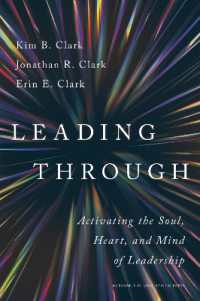Full Description
From its origins in the University of Birmingham's then Institute of Education in 1948, Educational Review has emerged as a leading international journal for generic educational research. Seventy-five years on, Mapping the Field presents a detailed account of education theory and research, policy, and practice through the lens of key articles published in the journal over this timespan.
Volume II opens with Part I, a collection of articles examining teachers' job (dis/) satisfaction and stress, and the gendered composition of the teaching workforce. Articles in Part II trace a shift in academic focus from schools seen as families/communities, to the parent-school relationship. The concepts of inclusion and equality—and strategies for their fulfilment in education—are interrogated in Part III. The volume concludes with Part IV, in which diverse identities in the education field are represented.
Curated and introduced by the editors, the articles included in both volumes of Mapping the Field represent a careful selection from the work of scholars whose ideas have been, and continue to be, influential in the field of education. Overall, this major text covers a wide range of topics and offers original insights into educational policy, provision, processes, and practice from around the world.
Contents
Part 1: Teachers and their work 1. Men teachers and the "feminised" primary school: a review of the literature 2. The Place of Women in Teacher Education: discourses of power 3. Teacher Stress: directions for future research 4. Teachers as 'managed professionals' in the global education industry: the New Zealand experience 5. Teacher job satisfaction: the importance of school working conditions and teacher characteristics Part 2: Family and community 6. The family group 7. Secondary schools as communities 8. Challenging the status quo: the enabling role of gender sensitive fathers, inspirational mothers and surrogate parents in Uganda 9. Barriers to parental involvement in education: an explanatory model 10. Effects of parental involvement on academic achievement: a meta-synthesis 11. Parental involvement to parental engagement: a continuum Part 3: Exclusion and inequality in education 12. "Inclusion in Practice": does practice make perfect? 13. Why poor children are more likely to become poor readers: the early years 14. Coincidence or conspiracy? Whiteness, policy and the persistence of the Black/White achievement gap 15. Whose justice is this! Capitalism, class and education justice and inclusion in the Nordic countries: race, space and class history 16. Supporting transgender students in schools: beyond an individualist approach to trans inclusion in the education system Part 4: Identity and diversity 17. Evaluative reactions to accents 18. Cultural and Linguistic Diversity in Education: a mainstream issue? 19. Gendered perceptions of schooling: classroom dynamics and inequalities within four Caribbean secondary schools 20. Beyond responsiveness to identity badges: future research on culture in disability and implications for Response to Intervention 21. Autism, intense interests and support in school: from wasted efforts to shared understandings 22. Who's checkin' for Black girls and women in the "pandemic within a pandemic"? COVID-19, Black Lives Matter and educational implications








